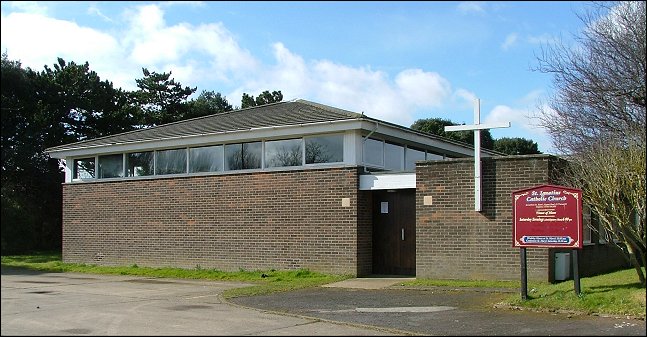| |
|
St
Ignatius of Loyola, Caister-on-Sea
 |
|
Chris
Harrison was showing me around the Great Yarmouth
area, the churches of which he knows better than
just about anybody, and when I told him that
there was a Catholic church in Caister I wanted
to see, he didn't bat an eyelid, and we found it
easily on the Ormesby road in the northern
suburbs. Even on a bright early spring day
like this it was hard to declare St Ignatius
particularly attractive, but it serves its
purpose, and is obviously loved and cared for. It
is a chapel of ease within the Catholic parish of
Great Yarmouth, but I am afraid that, like the
great majority of Catholic churches in East
Anglia, it is kept locked, so I can't tell you
what it is like inside.
|
Catholic
churches serve a devotional function as well as a
liturgical one. The blessed sacrament is reserved inside
so that the faithful may pray in its presence, but this
isn't possible if the church is locked. This devotional
function was shared by our medieval parish churches,
which were also built for the devotions of the Catholic
Church as much as for its liturgy, a point easily
forgotten nowadays. It is easy to see how it might serve
this function on an east Norfolk housing estate, and it
would be a form of witness as well.
| Michael
Evans, our pleasant, easy-going Bishop, had just
issued a pastoral letter asking Catholic
congregations in East Anglia to make themselves
welcoming to visitors. So, as a Catholic myself,
I had written to him to say that I thought one
way of doing this would be to make sure the
churches were open and accessible outside of Mass
times. After all, most Anglican churches in
Norfolk manage this. My message
was intercepted by the Bishop's private
secretary, Father Mark Hackeson, who sent me a
scorching e-mail criticising several entries on
my site which had suggested that it was Diocesan
policy to close and mothball smaller churches and
chapels of ease. I never got to read the Bishop's
thoughts on open Catholic churches, so I am
unable to pass them on to you now. And, of
course, I am also loathe to suggest that St
Ignatius of Loyola has anything other than a
secure future.
|
|
 |
Simon Knott, March 2006
|
|
|

